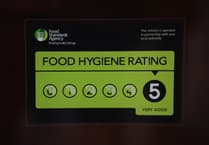Last week, it was announced that the United Kingdom has entered another recession, in a blow to Prime Minister Rishi Sunak’s pledge to grow the economy.
It’s thought that people spending less due to the cost of living, doctor strikes, and a fall in school attendance contributed to the dip in the economy at the end of last year. In Wales, workers are being hit harder than the rest of the UK during the cost-of-living crisis, with the average worker wanting £20K more per year to live comfortably.
In October and through to December 2023, the UK economy shrank by 0.3%, following another shrink between July and September. To be in recession, the country has to fail to grow for two consecutive quarters.
In 2023, the UK economy grew by 0.1%, the weakest since 2009, and not including Covid.
Research conducted by Reed revealed salary expectation gaps across the UK – with workers in Wales feeling £43,000 is a comfortable salary to live on, whereas, in comparison, the average wage in the region is currently £23,000.
Pinning this against the national statistics, Wales is experiencing a more intense wage gap, with the average salary expectation gap across the UK being £14K.
As part of Reed’s annual salary guides, the recruiter analysed more than 17 million job adverts and asked 5,000 UK workers a range of questions on their salary and benefits – both current and expected. Workers on the UK’s average salary of £35,000 would need a 40% pay rise to survive the sharp increase in the cost of living – totalling up to a substantial £1.2K extra per month to keep up. To compare, workers in Wales would need an extra £1.6K per month.
For the area of Brecon and Radnor, two businesses spoke to The Brecon and Radnor Express to share their thoughts of what the recession might mean for them.
Mary Cobbett owns Deli Tinto in Presteigne. She says that the recession, amidst the rising cost of living, is putting a continued squeeze on her business and her income. “My business is owned and run by me - a member of the community. I know and can relate to my customers, but costs are rising, and it’s harder and challenging to make a profit. There has been no increase in income yet, in April I’ll be compelled to increase wages yet again.”
Her deli, on the Presteigne high street, offers a mix of eclectic British and continental foods many sourced from award-winning small producers in Wales. Staying local, and providing for the local economy is paramount to Mary, but she questions the apparent imbalance between the differing challenges of large and small businesses and the personal strain on her as a sole-trader. “Should big business be continued to be allowed to make big profits to pay director bonuses and shareholder dividends, at the expense of small businesses that contribute to a greater extent and more directly to the well-being of communities?”
The news of the recession has made Mary worry about what the future would look like, both for the area and her staff. “The existence of my shop adds value. Alongside other independent businesses, it contributes to the high street, and to life and draw of the town. But its longevity is fragile. Were any of us to close we would be missed and cause a negative impact on both the lives of the local people who work for me and the community we serve.
“It would be nice to be supported for playing our part in improving the local economy.
“I like to think I’m a fair employer. I consider the well-being of my staff to be paramount. I have always paid above minimum wage and have met my responsibilities regarding holiday pay and pensions, but to continue to have things imposed from above with no support in other areas is challenging and seems a little unfair.”
For the owners of a vineyard in Presteigne, the recession is something they’re simply going to cope with. Susan Kinsey-Jones, who runs Whinyard Rocks Cottage & Vineyard with her husband James, says: “We're not so worried about the news of a recession as it's a reflection of what's happened over the last 6 months and we have already seen the effects of the cost of living and increased costs on our business. What may be a concern is whether the consumers change their behaviour in response to the news and cut back further on discretionary spending.”
They produce natural wine made with their own grapes, grown regeneratively and hand-harvested by a small team. With no other employed staff, Susan aims to enrich the environment, restore soils and make vibrant wines, teeming with life and character that reflect the wildness of the Welsh hills. “Whinyard Rocks is a small-scale low-intervention vineyard producing natural wines and a secluded boutique holiday cottage in mid-Wales. It's a wild idea of the fourth generation to create a sustainable future for our family’s sheep farm.
“We plan to grow our business slowly - literally! Vines take 3-5 years to establish and we've planted 4000 of them across several years. Running a vineyard is a long-term venture that spans decades. We're growing our business slowly to allow us to focus on our business aims thoughtfully and with purpose as we discover what works and how we can have a truly sustainable business that fits with family life.
“The news of a recession we don't think will delay our planned growth opportunities. Instead, we'd look to be vigilant and adaptable by keeping an eye on potential threats as well as opportunities and shift our thinking accordingly.”
Becky Hole, Senior Regional Director for Wales at Reed, said: “The ongoing cost-of-living crisis has hit Wales a lot harder than other UK regions, with the wage expectation gap being one of the biggest.
“Remote working presents an even bigger challenge to companies looking to recruit in Wales – often offering higher salaries. This, on top of the threat from companies over the bridge on the Southeastern side of the country, means businesses in Wales need to look to benchmark what they are offering to new and existing employees to attract and retain people.
“Across the board, we’re seeing a higher number of job applications as people look to battle the bite of the economic climate, so it’s important that even if high salaries can’t be offered, businesses look at benefits and reward packages that really appeal on an individual level.”
In addition to this, 33% of workers in Wales felt that their financial outgoings were negatively impacting their mental health, with 26% not feeling confident that they will achieve their financial saving goals as planned. The research also unveiled that 46% are actively looking for and considering new job opportunities, with 40% believing they could get paid better elsewhere. Reed has produced a suite of 16 sector-specific salary guides, which includes an in-depth analysis of a survey with 5,000 UK workers, assessing their current and preferred salaries and benefits, their organisation’s performance and priorities, how they rated their job security and the future of their sector, and the key recruitment and skills trends they’re witnessing.





Comments
This article has no comments yet. Be the first to leave a comment.